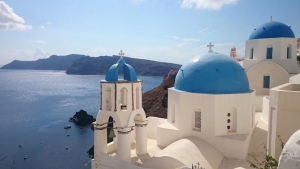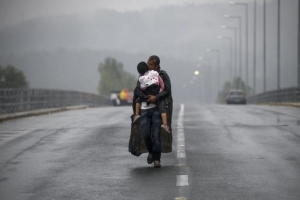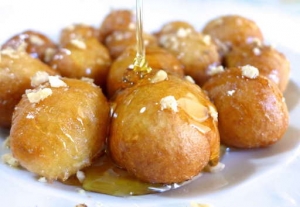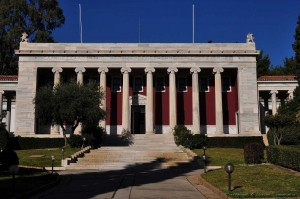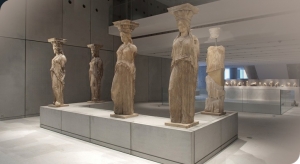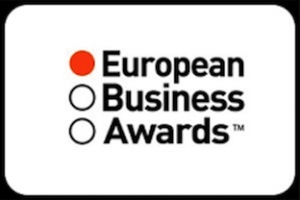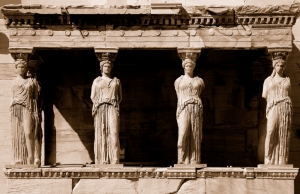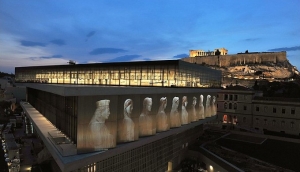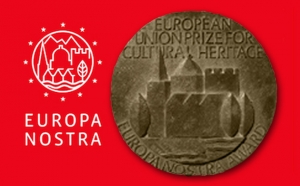LIFE & CULTURE
XpatAthens
Tuesday, 26 April 2016 07:00
TripAdvisor Names Santorini #1 Island In Europe
Santorini ranked as the best island in Europe and second best in the world in the TripAdvisor 2016 Travelers’ Choice awards for Islands, announced recently this year.
“Even if you’ve never been to this Cyclades island in the Aegean Sea, you’d still recognize it immediately – candy-colored houses carved into cliffs, sapphire waters, gleaming white buildings topped with half-spheres the color of a stormy sky”, TripAdvisor says about Santorini, while giving special mention to Imerovigli village and adding that Oia is world famous for its sunsets.
Top 10 Travelers’ Choice Islands – Europe
1. Santorini, Cyclades
2. Majorca, Balearic Islands
3. Madeira, Madeira Islands
4. Crete, Greece
5. Tenerife, Canary Islands
6. Rhodes, Dodecanese
7. Gran Canaria, Canary Islands
8. Corsica, France
9. Jersey, Channel Islands
10. Island of Capri, Province of Naples
Top 10 Travelers’ Choice Islands – Greece
1. Santorini, Cyclades
2. Crete, Greece
3. Rhodes, Dodecaneses
4. Mykonos, Cyclades
5. Zakynthos, Ionian Islands
6. Corfu, Ionian Islands
7. Kefallonia, Ionian Islands
8. Naxos, Cyclades
9. Skiathos, Sporades
10. Milos, Cyclades
To read this article in full, please visit: Greek Travel Pages
Image Credit: Santorini Walking Tours
To read this article in full, please visit: Greek Travel Pages
Image Credit: Santorini Walking Tours
Published in
Greece In The News
Tagged under
Monday, 25 April 2016 07:00
Reuters Team From Greece Among 2016 Pulitzer Prize Winners
The Reuters team, Yannis Behrakis, Alkis Konstantinides & Alexandros Avramides, won a 2016 Pulitzer Prize for breaking news and photography of the European refugee crisis.
The Reuters photo coverage of Middle Eastern migrants arriving in Europe was led by Yannis Behrakis, chief photographer for Greece and Cyprus and the Guardian newspaper's 2015 Agency Photographer of the Year.
The team captured a series of images of migrants crowded on flimsy sea craft and their first moments upon reaching Europe.
"We showed the world what was going on, and the world cared. It showed that humanity is still alive," Behrakis said. "We made for these unfortunate people’s voice to be heard. Now with a Pulitzer, we feel that our work has been professionally recognized."
Some images showed families rushing ashore, flailing away in the water or collapsing on the beach. Others juxtaposed the rafters at sea with a cruise ship or a leaping dolphin or the setting sun.
The Reuters photo staff was named as co-winner for breaking news photography along with Mauricio Lima, Sergey Ponomarev, Tyler Hicks and Daniel Etter of The New York Times, also for their images of the migrant crisis.
It was the third Pulitzer for Reuters, a unit of Thomson Reuters, having won for international reporting in 2014 and for breaking news photography in 2008.
To read this article in full, please visit: Reuters
To read this article in full, please visit: Reuters
Published in
Local News
Tagged under
Wednesday, 20 April 2016 07:00
Best Places For Dessert In Athens
Chrissy from TravelPassionate put together a guide to her favorite places for dessert. Athens has a delicious food scene and these are just a few places to satisfy your sweet tooth.
Nancy’s sweet home a.k.a. Serbetospito
Nancy’s sweet home is an all day café that serves handmade desserts made by Nancy herself. Specialties include the “Love dessert” which is a juicy chocolate cake with praline and chocolate sauce and “Kiounefe” with traditional Kaimaki ice-cream on top. You can find it at Pl. Iroon 1 in Psyrri.
Krinos
Krinos is a traditional sweet shop that serves the best loukoumades in town since 1923. Loukoumades are little yeast risen puffs that are deep-fried until golden brown and then drizzled with honey and sprinkled with cinnamon. You can find it at Aiolou 87.
Karakoy Gulluoglu
If you have traveled to Istanbul you will probably have heard about this shop selling the best baklava in town. Now you can find it in the centre of Athens serving many kinds of delicious baklava totally worth trying. You can find it at Nikis 10 near Syntagma.
Nice Cream
Here you will taste one of the most delicious gelato in the city made from fresh ingredients and without the use of any preservatives. They serve a lot of ice cream flavors and every week there is a new flavor to try. They also have delicious coffee and cake to try. You can find it at Kosta Varnali 19, Nea Erithrea.
To read this article in full, please visit: Travel Passionate.
To read this article in full, please visit: Travel Passionate.
Published in
Restaurants In Athens
Tagged under
Wednesday, 20 April 2016 07:00
THI Announces Grant To American School Of Classical Studies In Athens
The Hellenic Initiative (TΗΙ) announces a grant of $50,000 for the support of The Library Project at the Gennadius and Blegen libraries of The American School of Classical Studies (ASCS) in Athens. Through this grant, part of THI’s programs supporting youth education in Greece, two young librarians will have the opportunity to receive training in collections care and management in preparation for a career in library science for a one-year period, contributing at the same time in the strategic plan of modernization and digitalization of the Libraries’ catalogues and archives.
The American School of Classical Studies is a private research center located in the heart of Athens, committed to education, archaeological exploration and scholarly research since 1881. Moreover, the two ASCSA Libraries provide one of the best research facilities to scholars working in Greece. The Gennadius Library is among the most renown in the world for the study of Byzantine, Medieval, and modern Greece, and the Blegen Library is devoted to the study of Greece and Rome. “The Library Project” is a long-term plan to combine and streamline the Blegen and Gennadius Libraries, re-organizing their holdings in order to provide readers with greater access to the collections.
Michael Printzos, THI Director of Programming, stated: “THI support for this project is about the preservation of the past and prepartaiton for the future. The consolidation and modernization of the Libraries and Archives of ASCSA, improving and making more accessible significant chapters of our history from antiquity to the present is an ongoing vital mission. At the same time, we are pleased to give the opportunity to two young professionals to work for one of the most prestigious institutions gaining significant experience for their professional development”.
Dr. Maria Georgopoulou, Gennadius Library Director, added: “The support of The Hellenic Initiative is very important for us, since it enables us to offer work opportunity to two new graduates, who acquire valuable experience in a healthy work environment operating under US standards. We are thankful for THI’s support and hope that it will continue its efforts towards the support of Greek youth.”
For more information, please visit: The Hellenic Initiative and One Greece
For more information about ASCSA, please visit: The ASCSA
The Hellenic Initiative and their Mission: Investing in the future of Greece through direct philanthropy and economic revitalization. We empower people to provide crisis relief, encourage entrepreneurs, and create jobs. We are The Hellenic Initiative (THI) - a global movement of the Greek Diaspora.
The American School of Classical Studies at Athens: The American School of Classical Studies at Athens (ASCSA) strives to maintain and enhance its position as the preeminent center for the study of the Greek world from antiquity to the present day. It advances knowledge of Greece in all periods, as well as other areas of the classical world, by training young scholars, sponsoring and promoting archaeological fieldwork, providing resources for scholarly work, and disseminating research. The ASCSA is also charged by the Hellenic Ministry of Culture and Tourism with primary responsibility for all American archaeological research, and seeks to support the investigation, preservation, and presentation of Greece’s cultural heritage.
Michael Printzos, THI Director of Programming, stated: “THI support for this project is about the preservation of the past and prepartaiton for the future. The consolidation and modernization of the Libraries and Archives of ASCSA, improving and making more accessible significant chapters of our history from antiquity to the present is an ongoing vital mission. At the same time, we are pleased to give the opportunity to two young professionals to work for one of the most prestigious institutions gaining significant experience for their professional development”.
Dr. Maria Georgopoulou, Gennadius Library Director, added: “The support of The Hellenic Initiative is very important for us, since it enables us to offer work opportunity to two new graduates, who acquire valuable experience in a healthy work environment operating under US standards. We are thankful for THI’s support and hope that it will continue its efforts towards the support of Greek youth.”
For more information, please visit: The Hellenic Initiative and One Greece
For more information about ASCSA, please visit: The ASCSA
The Hellenic Initiative and their Mission: Investing in the future of Greece through direct philanthropy and economic revitalization. We empower people to provide crisis relief, encourage entrepreneurs, and create jobs. We are The Hellenic Initiative (THI) - a global movement of the Greek Diaspora.
The American School of Classical Studies at Athens: The American School of Classical Studies at Athens (ASCSA) strives to maintain and enhance its position as the preeminent center for the study of the Greek world from antiquity to the present day. It advances knowledge of Greece in all periods, as well as other areas of the classical world, by training young scholars, sponsoring and promoting archaeological fieldwork, providing resources for scholarly work, and disseminating research. The ASCSA is also charged by the Hellenic Ministry of Culture and Tourism with primary responsibility for all American archaeological research, and seeks to support the investigation, preservation, and presentation of Greece’s cultural heritage.
Published in
Local News
Tagged under
Monday, 05 March 2018 07:00
Bold Women Of Ancient Greece
It's common to hear about men from Classical Greece who had an impact on society, but rarely do we hear about bold and fascinating women from this time who changed history in her own way. Here are just a few women known for her their boldness and impact on Greece's history.
Agnodice of Athens (4th century BC)
No woman’s life and work was considered more scandalous and shocking at the time Agnodice, who was the first female doctor in ancient Athens and whose challenge to the male-dominated profession changed the laws regarding women practicing medicine.
Women had always been allowed to perform the services of midwife and could even attend patients, until it was alleged that they were helping their female patients procure abortions. After that, women were not allowed to practice medicine, and the penalty for doing so was death. Agnodice cut her hair and disguised herself as a man in order to study medicine and even traveled to Egypt, where women were held in higher regard and could be doctors, in order to learn her craft. Still in her guise as a man, she returned to Athens and began to treat people.
She became so popular among female patients (who knew she was a woman) that she was accused by a group of men (who thought she was a man) of seducing them. She was put on trial in the Areopagus and, in defending herself against the charge, revealed she was a woman. The men then threatened to execute her for breaking the law by practicing medicine while pretending to be a man. She was saved by her female patients who shamed the court into acquitting her. It seems as though they pointed out how Agnodice had been successfully practicing medicine for some time now and that the male doctors were simply jealous. After her trial, the laws were changed so that women could practice medicine equally with men.
Telesilla of Argos (5th century BC)
Of the poets listed with Anyte in Antipater’s list of earthly muses is Telesilla of Argos who, though famous for her poetry, became more so for defending her home city against the invading Spartans in 494/493 BC.
After Cleomenes I of Sparta decimated the Argive forces, he marched to the city of Argos. Telesilla took down the ornamental arms from temples in the city, raided the armory for whatever was left, and equipped a force of the city’s women with arms and armor. Her organized women defense team inflicted heavy losses on the Spartans and ultimately defeated them, as Sparta withdrew its army, and Argos was saved.
Hydna of Scione (480 BC)
Hydna of Scione was trained to swim by her father, Scyllis, a diving instructor and expert swimmer who taught the art of swimming for a living. He instructed his daughter from a young age, and she became well known for her ability to dive deeply and swim long distances.
During the Persian invasion at Salamis, Hydna and her father swam more than 16 km to dive under the Persian ships and cut the moorings loose, causing the ships to drift and damage other vessels. The Persian navy wanted to destroy what was left of the Greek force, but thanks to Hydna and her father, Greece defeated the Persians at Salamis and Greece was saved.
To read more about these fascinating women and others, please visit: The Pappas Post
Image credit: Acropolis Museum.
To read more about these fascinating women and others, please visit: The Pappas Post
Image credit: Acropolis Museum.
Published in
Greek Language & Culture
Tagged under
Tuesday, 19 April 2016 07:00
Greek Businesses Among Europe’s Best
Four Greek companies were selected recently, among the top 110 European companies, as the finalists and “Ruban d ‘Honneur” 2015/2016 recipients of the prestigious European Business Awards (EBAs). The businesses advanced to the next and final phase of the competition where the winners will be announced in each of the 11 categories at the Awards Gala Final on 17 June in Milan.
The four Greek companies that qualified for the final are Coffee Island, Megas Yeeros, Pharma-Data, and Vikos.
The EBA’s National Champions and “Ruban d ‘Honneur” finalists are selected by an esteemed panel of around 150 independent judges made-up of European business and political leaders, academics, and entrepreneurs. The “Ruban d ‘Honneur” title is given to the top ten companies from all over Europe for each of the 11 categories of the awards, including Entrepreneur of the Year Award, Award for Customer Focus, Employer of the Year Award, etc.
36 Greek companies were initially distinguished as National Champions, which put Greece in 6th place of total distinctions by country, among a pool of 678 additional National Champions from 33 countries across Europe.
In an online video public vote running alongside the independent judging part of the competition, the Greek company, Loux, was named as the National Public Champion for Greece in the 1st phase of public voting between January and February after almost 160,000 people voted online. There are now 32 National Public Champions competing for a second public vote that runs until 26 April. The company from across Europe with the most votes at the end of this period will be announced as the ultimate European Public Champion also at the EBA’s Gala Final in June.
To read this article in full, please visit: Greek News Agenda.
To read this article in full, please visit: Greek News Agenda.
Published in
Greece In The News
Tagged under
Sunday, 17 April 2016 18:07
International Day For Monuments & Sites
With the Olympic Games taking place in Rio de Janeiro, Brazil, in August 2016, ICOMOS has dedicated this year's International Day For Monuments & Sites, Monday April 18, 2016, to the heritage of sports.
In celebration of this day in Greece, the Ministry of Culture and Athletics has announced that all archaeological sites will have free admission to the public on Monday April 18, 2016. Museums will also participate, with the exception of museums that are closed on Monday's.
During the upcoming Easter holidays, sites and museums in Greece will hold the following hours:
Friday April 29: 12:00-17:00
Saturday April 30: 8:00-15:00
Sunday May 1: Closed
Monday May 2: Open with regular hours
Tuesday May 3: Closed due to reschedule of May 1st holiday (Protomagia)
Source: lifo.gr
Published in
Local News
Tagged under
Monday, 18 April 2016 07:00
Best Landmarks To Visit In Athens
Inhabited for more than 3,000 years, Athens is widely known as the cradle of Western civilization and the birthplace of democracy. Consisting of a large city center, an urban district and metropolitan area, Athens presents a stunning blend of historical and modern features. Here are just a few of some of the best landmarks to visit.
Acropolis Museum
This marvel of a museum engagingly presents everything you need to know about the Acropolis, its individual temples and the remarkable ancient civilization responsible for it all. You’ll want to make time to see the whole museum, but if pressed for time, take the elevator to the top level to see a veritable recreation of the Parthenon in its heyday, with all the sculptures, columns, metopes, and friezes (originals and plaster-cast copies) in place.
Anafiotika
With its low whitewashed houses and steep meandering skinny streets, this 19th-Century neighborhood looks like an island in need of a sea. Which makes perfect sense, since it was built by refugee stonemasons from the Cycladic island of Anafi.
The Parthenon
Considered the jewel of Ancient Greece, the Parthenon is an architecturally and historically significant building in the Western World. It’s an extraordinary sight, especially considering that this intricately carved 23,000-square-foot temple is more than 2,500 years old.
Temple of Poseidon
Cape Sounion is found on the south-east coast of Athens, on the southern tip of the Attica peninsula. Some of the archaeological items found in this site date from as early as the 8th century BC, while Herodotus affirms that in the 6th century BC, the Athenians used to celebrate a quadrennial festival at Cape Sounion.
Odeum of Herodes Atticus
This is a replica of the Classical-style stone theatre, built in 161 AD on the southwest slope of the Acropolis, adjacent to the Theatre of Dionysus, which was used as a music hall. The Odeum was destroyed just 100 years after it was built in 161 AD, but in the 1950’s, a wealthy Athenian funded the reconstruction and now today, the Odeum is host to the annual Athens Festival and a popular concert venue throughout the year.
To read the full list of the best landmarks in Athens, please visit: Messonghi
To read the full list of the best landmarks in Athens, please visit: Messonghi
Published in
City Discovery
Tagged under
Thursday, 14 April 2016 07:00
Greece Wins Double EU/Europa Nostra Awards For Cultural Heritage
Greece is one of the 28 award winners of the 2016 European Union Prize for Cultural Heritage/Europa Nostra Awards. The country scored two awards in the category of “Conservation” for the Byzantine Church of St. Peter in Kastania, Mani, and the Traditional Watermill in Agios Germanos, Prespes.
The winners of the award, considered Europe’s highest honour in the heritage field, were revealed by the European Commission and Europa Nostra. Independent expert juries assessed a total of 187 applications, submitted by organisations and individuals from 36 countries across Europe, and selected the winners.
The winners of the European Heritage Awards 2016 will be celebrated during a high-profile event co-hosted by EU Commissioner Navracsics and Maestro Plácido Domingo in Madrid at the end of May.
To read this article in full, please visit: Greek Travel Pages
To read this article in full, please visit: Greek Travel Pages
Published in
Greece In The News
Tagged under
Tuesday, 12 April 2016 07:00
Vegan Olive Oil And Orange Cookies
Not all desserts have to be chocolate, right? Try these vegan olive oil and orange cookies, which align perfectly with the healthy mediterranean diet. This recipe is a great way to give in to your sweet tooth without feeling guilty.
Ingredients:
Ingredients:
- 200 g olive oil
- 120 g orange juice
- Grated zest from 1 orange
- 200 g granulated sugar
- ½ cup cognac
- 1 teaspoon baking powder
- ½ teaspoon baking soda
- ½ teaspoon ground cinnamon
- 600 g flour
- A generous amount of sesame seeds (optional)
Published in
Greek Food & Diet
Tagged under

